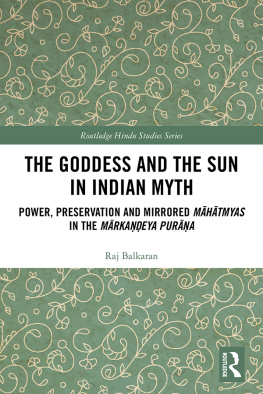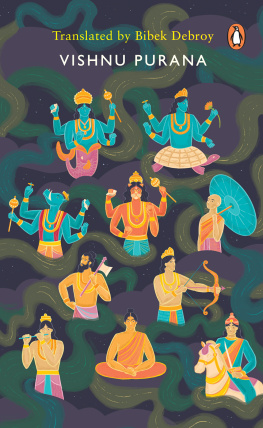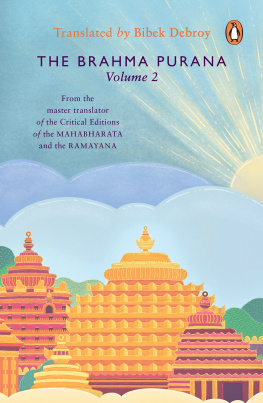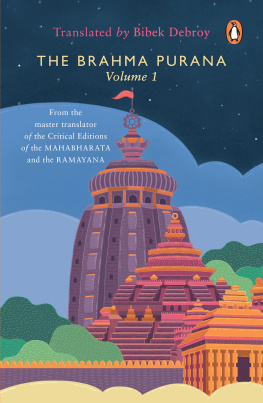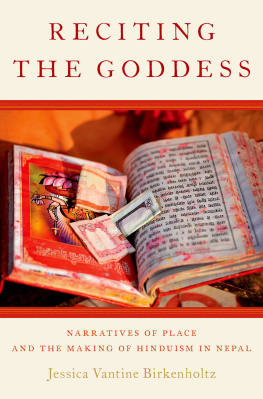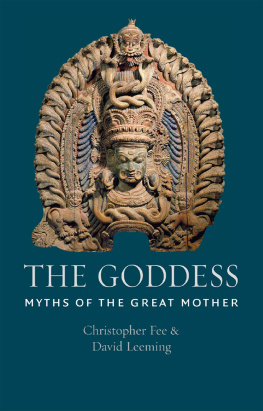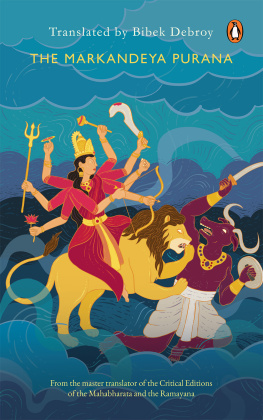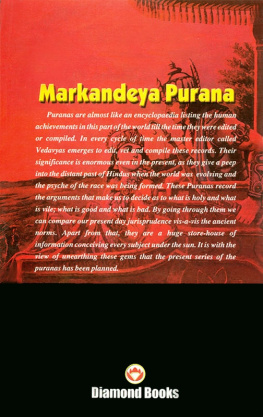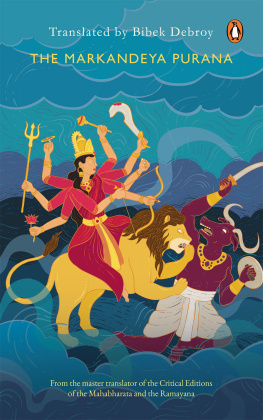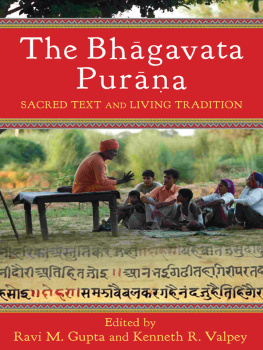Table of Contents
Guide
Print Page Numbers
The Goddess and the Sun in Indian Myth
In analysing the parallels between myths glorifying the Indian Great Goddess, Durg, and those glorifying the Sun, Srya, found in the Mrkaeya Pura, this book argues for an ideological ecosystem at work in the Mrkaeya Pura privileging worldly values, of which Indian kings, the Goddess (Dev), the Sun (Srya), Manu and Mrkaeya himself are paragons.
This book features a salient discovery in Sanskrit narrative text: just as the Mrkaeya Pura houses the Dev Mhtmya glorifying the supremacy of the Indian Great Goddess, Durg, it also houses a Srya Mhtmya, glorifying the supremacy of the Sun, Srya, in much the same manner. This book argues that these mhtmyas were meaningfully and purposefully positioned in the Mrkaeya Pura, while previous scholarship has considered this haphazard interpolation for sectarian aims. The book demonstrates that deliberate compositional strategies make up the Saurakta symbiosis found in these mirrored mhtmyas. Moreover, the author explores what he calls the dharmic double helix of Brahmanism, most explicitly articulated by the structural opposition between pravtti (worldly) and nivtti (other-worldly) dharmas.
As the first narrative study of the Srya Mhtmya, along with the first study of the Mrkaeya Pura (or any Pura), as a narrative whole, this book will be of interest to academics in the field of Religion, Hindu Studies, South Asian Studies, Goddess Studies, Narrative Theory and Comparative Mythology.
Raj Balkaran teaches at the School of Continuing Studies at the University of Toronto, Canada. He is also the host of New Books in Hindu Studies, a podcast channel on the New Books Network, and the author of The Goddess and The King in Indian Myth (Routledge, 2019).
Routledge Hindu Studies Series
Series Editor: Gavin Flood, Oxford Centre for Hindu Studies

The Routledge Hindu Studies Series, in association with the Oxford Centre for Hindu Studies, intends the publication of constructive Hindu theological, philosophical and ethical projects aimed at bringing Hindu traditions into dialogue with contemporary trends in scholarship and contemporary society. The series invites original, high quality, research level work on religion, culture and society of Hindus living in India and abroad. Proposals for annotated translations of important primary sources and studies in the history of the Hindu religious traditions will also be considered.
Caitanya Vaiavism in Bengal
Social Impact and Historical Implications
Joseph T. OConnell, edited by Rembert Lutjeharms
Vedic Practice, Ritual Studies and Jaiminis Mmsstras
Dharma and the Enjoined Subject
Samuel G. Ngaihte
The Legacy of Vaiavism in Colonial Bengal
Edited by Ferdinando Sardella and Lucian Wong
Salvation in Indian Philosophy
Perfection and Simplicity for Vaieika
Ionut Moise
The Goddess and the Sun in Indian Myth
Power, Preservation and Mirrored Mhtmyas in the Mrkaeya Pura
Raj Balkaran
For more information about this series, please visit: www.routledge.com/asianstudies/series/RHSS
The Goddess and the Sun in Indian Myth
Power, Preservation and Mirrored Mhtmyas in the Mrkaeya Pura
Raj Balkaran

First published 2020
by Routledge
2 Park Square, Milton Park, Abingdon, Oxon OX14 4RN
and by Routledge
52 Vanderbilt Avenue, New York, NY 10017
Routledge is an imprint of the Taylor & Francis Group, an informa business
2020 Raj Balkaran
The right of Raj Balkaran to be identified as author of this work has been asserted by him in accordance with sections 77 and 78 of the Copyright, Designs and Patents Act 1988.
All rights reserved. No part of this book may be reprinted or reproduced or utilised in any form or by any electronic, mechanical, or other means, now known or hereafter invented, including photocopying and recording, or in any information storage or retrieval system, without permission in writing from the publishers.
Trademark notice: Product or corporate names may be trademarks or registered trademarks, and are used only for identification and explanation without intent to infringe.
British Library Cataloguing-in-Publication Data
A catalogue record for this book is available from the British Library
Library of Congress Cataloging-in-Publication Data
A catalog record has been requested for this book
ISBN: 978-0-367-33805-3 (hbk)
ISBN: 978-0-429-32202-0 (ebk)
Typeset in Times New Roman
by Wearset Ltd, Boldon, Tyne and Wear
For Satya, for lighting up my life
tat savitur vareya
bhargo devasya dhmahi
dhiyo yo na prachodayt
We meditate on the supreme splendour
of that divinely enlivening Sun;
May he illumine our minds.
g Veda, 3.62.10
Contents
Figure
Tables
Raj Balkaran has already established himself as one of the foremost scholars of the Puras with his work on the Dev Mhtmya. The Mrkaeya Pura, in which this text occurs, also contains another set of chapters, which Balkaran has rightly considered to be a Srya Mhtmya or text of glorification to the Sun god, a text which has scarcely been mentioned by earlier scholars. It is to this text that the present volume directs its attention, and in exploring this mhtmya, he also shows how thematically interconnected it is with the Dev Mhtmya, if not with the Mrkaeya Pura as a whole.
He contextualizes the Srya Mhtmya within the broad context of sun worship beginning from the g Veda and traces the few hymns to the Sun found in the third book of the Mahbhrata and in certain manuscripts of the Yuddhakhaa of the Rmyaa. In , he also gives a new interpretation of the well-known myth of SryaSajChy, and relates this directly to the main theme of the Dev Mhtmya where Both mythologies bespeak powerful feminine divinities whose efforts restore order in the face of peril and both bespeak the danger which results when fiery figures, though required to preserve our world, exceed safe bounds (XXX [116]). In doing so, he presents valid criticisms of Donigers structuralist interpretation of the myth emphasizing a contrast between good and bad mothers where versions of the myth coming from texts over one and a half millennia are afforded equal validity. Rather, Balkaran interprets this myth, with its lengthy antiquity, in terms of the principle themes of the Mrkaeya Pura, which inform the meaning of this myth in that text.
Above all, the incorporation of the mythology of the Sun in the Mrkaeya Pura contributes to the theme of the preservation of the ordered world as is also so strongly reflected in the avatric function of the Dev Mhtmya, the myths where kings play exemplary roles and the narratives of the

